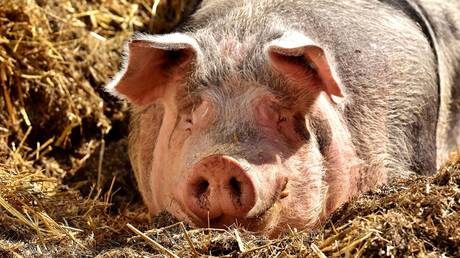
Transplanted heart infected with pig virus likely killed recipient of pioneering treatment
A Maryland man who died two months after receiving a genetically modified pig heart transplant likely succumbed to a pig virus the transplanted heart was infected with, his doctor revealed on Wednesday. End-stage heart disease patient David Bennett Sr. died in March, two months after undergoing the interspecies transplant surgery at the University of Maryland Medical Center in Baltimore. While he had initially appeared to respond well to the procedure, the first of its kind, his recovery did not last, and a spokesperson for the hospital where he died initially said there was “no obvious cause” for his passing.
However, Dr. Bartley Griffith, who performed the transplant on Bennett, now believes his death was caused by porcine cytomegalovirus – a preventable infection that is not believed to be able to infect humans. While the pig, supplied by biotech firm Revivicor, was supposed to be free of all pathogens, Griffith told the MIT Technology Review that doctors noticed a “blip” suggesting the presence of the virus 20 days after the procedure, and the team believes the donor pig was infected.
While the doctors initially ignored the readings, claiming the level of cytomegalovirus was very low and attributing it to an error, Griffith noted that by the 43rd day after surgery his patient “looked really funky” and had clearly fallen off the pathway to recovery. “Something happened to him. He looked infected. He lost his attention and wouldn’t talk to us.”
It’s not certain that Bennett died exclusively because of the cytomegalovirus infection – he was suffering from end-stage heart disease, after all, and treating an infection without triggering the patient’s immune system to reject the pig heart entirely required striking a careful balance. The doctors believe they might have hastened his death by giving him human antibodies, blood products that might have damaged the pig organ.
While some doctors worry that xenotransplantation – surgically implanting an organ from one species into another – could set off a new type of pandemic, there was no evidence that the virus that attacked Bennett’s heart had spread to any of his human body parts, and Massachusetts General Hospital transplant specialist Jay Fishman said there was “no real risk to humans” of the virus spreading beyond the donor organ.
However, given that the pig’s own immune system was absent and the human recipient was taking immunosuppressive drugs to prevent him from rejecting the transplant, such non-human viruses could be permitted to rage unchecked, destroying the organ in its new host body – or potentially causing other complications.
Aside from the viral infection, the operation was considered to be a success, according to multiple doctors who spoke to MIT Technology Review – the heart recipient did not reject the transplanted organ, which was the critical part of the experiment. “It was quite amazing. You go to talk to this gentleman and he’s got a pig heart. Literally, he has a pig heart,” Griffith, the surgeon who performed the operation, gushed – even while acknowledging that the surgery team was “like a blind group of squirrels” scurrying around in the dark to manage a condition they didn’t fully understand.
The donor pig received 10 gene modifications in total, including the removal of genes that could cause hyper-fast organ rejection. It was also given human genes to facilitate acceptance by the patient’s body. Several other biotech firms are likely to advance their own pig-to-human transplants in the coming months.




